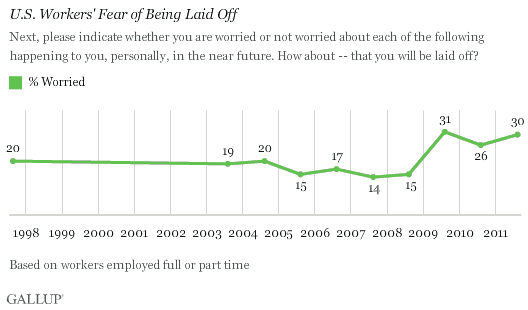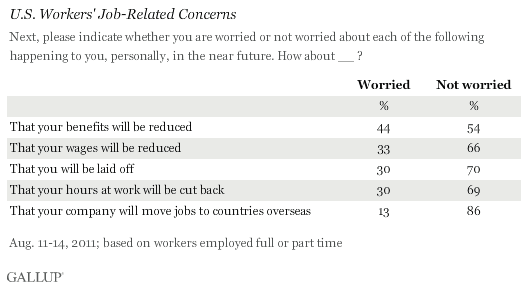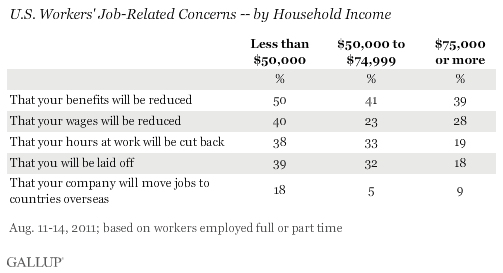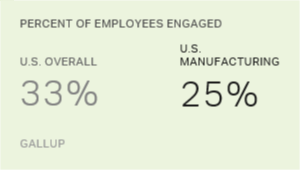PRINCETON, NJ -- American workers' concerns about various job-related cutbacks have returned to the record highs seen in 2009, after improving slightly in 2010. In terms of the most significant employment risk measured, 3 in 10 workers currently say they are worried they could soon be laid off, similar to the 31% seen in August 2009 but double the level recorded in August 2008 and for several years prior.

Separately, 30% of workers say they are worried their hours will soon be cut back, and 33% worry their wages will be reduced. An even larger number, 44%, worry their benefits will be reduced, making this the most prevalent job-related concern.

Workers are least likely to be concerned that their company will move jobs overseas; however, at 13%, this is by one percentage point the highest level of concern since Gallup began measuring it in 2003. Most of the five items tested are at or near record highs this year.
The new findings are from Gallup's 2011 Work and Education poll, conducted each August. This year's update was conducted Aug. 11-14 and is based on nationally representative telephone interviews with 489 adults currently employed full or part time.
The extent of worry about job-related cutbacks is closely related to household income. Adults in households earning less than $50,000 are about twice as likely as those making $75,000 or more to be worried about being laid off, having their hours reduced, and seeing their company move jobs overseas. They are also somewhat more likely to be worried about reduced wages and benefits.

Similarly, workers with no college education are typically more likely than those with either some college education or a college degree to be worried about these negative job prospects.
Bottom Line
With the U.S. unemployment rate running 50% higher than it was in 2008 (approximately 9% today vs. 6% then), American workers are again expressing record- or near-record-high levels of concern about the stability of their jobs and income. This reverses the slight improvement seen a year ago, when U.S. workers' concerns about losing a job, pay, or benefits had abated slightly. The rates of concern are even higher among workers who are the most vulnerable to financial setback -- those with low to moderate incomes.
Together, the findings document the ongoing psychological impact of the country's economic problems on many working Americans and how fragile the economic recovery is in their eyes. When workers are worried about their jobs and their income more broadly, this is likely to affect broader economic confidence, the housing market, and consumer spending.
Survey Methods
Results for this USA Today/Gallup poll are based on telephone interviews conducted Aug. 11-14, 2011, with a random sample of 1,008 adults, aged 18 and older, living in all 50 U.S. states and the District of Columbia.
For results based on the total sample of national adults, one can say with 95% confidence that the maximum margin of sampling error is ±4 percentage points.
For results based on the sample of 489 adults employed full-or part-time, one can say with 95% confidence that the maximum margin of sampling error is ±6 percentage points.
Interviews are conducted with respondents on landline telephones and cellular phones, with interviews conducted in Spanish for respondents who are primarily Spanish-speaking. Each sample includes a minimum quota of 400 cell phone respondents and 600 landline respondents per 1,000 national adults, with additional minimum quotas among landline respondents by region. Landline telephone numbers are chosen at random among listed telephone numbers. Cell phone numbers are selected using random-digit-dial methods. Landline respondents are chosen at random within each household on the basis of which member had the most recent birthday.
Samples are weighted by gender, age, race, Hispanic ethnicity, education, region, adults in the household, and phone status (cell phone only/landline only/both, cell phone mostly, and having an unlisted landline number). Demographic weighting targets are based on the March 2010 Current Population Survey figures for the aged 18 and older non-institutionalized population living in U.S. telephone households. All reported margins of sampling error include the computed design effects for weighting and sample design.
In addition to sampling error, question wording and practical difficulties in conducting surveys can introduce error or bias into the findings of public opinion polls.
View methodology, full question results, and trend data.
For more details on Gallup's polling methodology, visit www.gallup.com.
